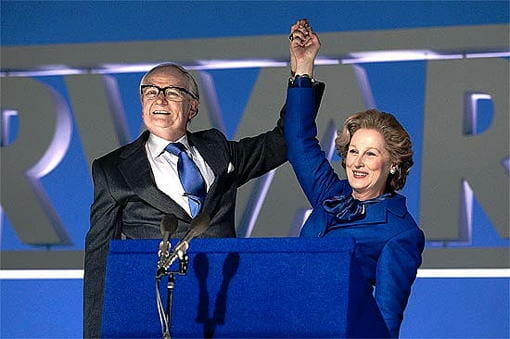By Pam Glazier · January 3, 2012

The Iron Lady looks like one of those films that are made to be Academy Awards contenders. I usually have trouble finding the inspirational spark of desire for seeing these kinds of films because even though they are well-made, that doesn’t mean that they are all good films. They are crafted within the genre of “Awards Winners.” This means that all of the things that go into films such as these can be described with adjectives such as: “subtle, rich, muted, underscored intensity”… stuff like that. They all seem to have a particular look, use the same kinds of actors, have the same types of sweepingly emotional music scores—and all of this is just a genre type, little tricks to indicate that the movie is awards-worthy. Sadly, it’s hard to make an amazing film, so when you simply adhere to little genre tricks, it doesn’t guarantee that you’re film will be good. This is how we get films like One Day and Julia and Julia. The latter had excellent moments, but overall was a disappointing film because the modern characters were forced and unrealistic. And the former was just flawed because the story didn’t properly establish the characters as people that the audience should care about, and so it was just an unmoving observation of missed connections. But thank goodness The Iron Lady doesn’t have these problems.
The Iron Lady is amazing throughout, and the performers and technical crew came together to seamlessly deliver this story despite it being one of the most complex narratives I’ve seen in a while. The narrative structure has multiple storylines that parallel and interplay against each other, but each of these parallels are disjointed eras of time within the singular linear narrative of the life of Margaret Thatcher (Meryl Streep). These memory fragments weave in and out of a sort of baseline structure (what the audience comes to know as “present day”)—long after Margaret Thatcher has left the office of the Prime Minister. In these fragments we experience her inner mind and emotions. When she is asked about a recent bombing during a high class dinner party of which she is the honoree, it is clear that in her mind, she is actually responding to a terrorist bomb threat that she had to deal with years before. She barely manages to cover her dottiness, and in that small scene, four-six birds are killed with one stone. We see her in her doddering confusion, we see her with strength in her convictions, we see through a single look from her daughter (Olivia Colman) the unpleasantness that occurs when the roles of children and parents are reversed as old age encroaches, we see the enormity of her power used to deftly maneuver around the inconsequential problems she must deal with now (as opposed to matters of statehood), and we see the vanity that remains despite the humility that tends to come with these kinds of conditions. Another scene in this film chooses to use the word “obstinate” as a focal point, and this scene also speaks to the character demanded of Mrs. Thatcher’s will if she is to meet the destiny that she eventually does.
As you can see from these few examples, there are just so many layers. And you know what? These layers are subtle, rich, and muted; with underscored intensity—and they’re AMAZING. This film is amazing. Now, perhaps I have been studying literature and cinema for too long within the academic setting. I am not above admitting that I am fluffy-brained when it comes to these things. I like French cinema, I’ve read everything Christopher Marlowe has ever written, and I have a disturbing fantasy-marriage with John Milton that is on constant playback in one of the more subconscious zones of my mind. These factors may coalesce into a predilection for this particular film, and thus cloud a truly objective review of it. But you know what else? I liked Horrible Bosses. So maybe I’m not as un-objective as I might have originally feared. I can get down with fart jokes too.
So I suppose you should take it from me because I am an aficionado of both extremes when it comes to high and low art. (Sorry for calling you “low art” Horrible Bosses, but you did have a character named “Motherfucker Jones”, so you can’t really blame me.)
Meryl Streep delivers an inspired performance, so much so that her Oscar nomination for Best Actress in The Devil Wears Prada is a besmirching insult to her talents. And both actors that played the old and young versions of Margaret’s husband Denis Thatcher (Jim Broadbent and Harry Lloyd, respectively) were incredible; so much emotion, so much communicated, with such slight action and delivery, it’s breathtaking. And all the technical details that went into this thing to firmly encapsulate this film within the genre of “Awards Selection” were so well done that I can hardly comment on them with my lowly laymen’s understanding of what goes on behind the scenes. The cinematography, art design, music, writing… hell, I’m downright positive that even the grips and best boys of this film were flouncing around with feathered hats, ensuring that all the “best-boy-ness” or “grip-ness” or whatever it is that they do met the standards of perfection.